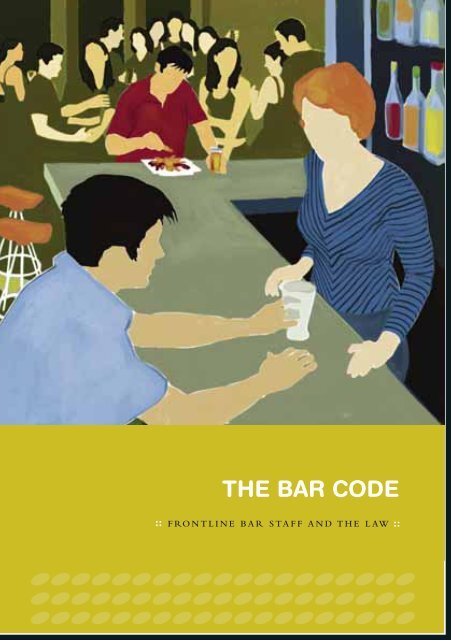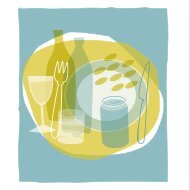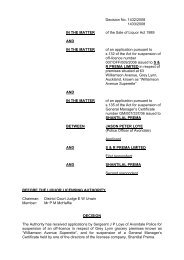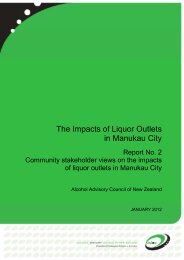THE BAR CODE - Alcohol Advisory Council of New Zealand
THE BAR CODE - Alcohol Advisory Council of New Zealand
THE BAR CODE - Alcohol Advisory Council of New Zealand
You also want an ePaper? Increase the reach of your titles
YUMPU automatically turns print PDFs into web optimized ePapers that Google loves.
<strong>THE</strong> <strong>BAR</strong> <strong>CODE</strong><br />
FRONTLINE <strong>BAR</strong> STAFF AND <strong>THE</strong> LAW
The information in this booklet is based on the National Host Responsibility Guidelines. These have been prepared<br />
by ALAC in conjunction with a range <strong>of</strong> agencies as a tool for being a responsible server and ensuring compliance<br />
with the Sale <strong>of</strong> Liquor Act.<br />
For further information about Host Responsibility and the Sale <strong>of</strong> Liquor Act, opportunities for training<br />
about these issues in your area, and various resources that are available, contact your local council’s District<br />
Licensing Agency.<br />
Or you can visit ALAC’s website www.alac.org.nz or call our freephone 0508 258 258.
01<br />
02<br />
03<br />
04<br />
05<br />
06<br />
Intoxication:<br />
Recognising it and dealing with it<br />
Minors:<br />
Who can drink, where<br />
Drinking options:<br />
Providing low or non-alcoholic choices<br />
Food:<br />
Ensuring customers have access to food<br />
Promotions:<br />
Special <strong>of</strong>fers and house rules<br />
Transport:<br />
Helping customers access transport options<br />
18+<br />
H O<br />
2<br />
$<br />
TA XI
“<br />
It’s all going nicely. Cheerful chat. Happy laughter.<br />
A good vibe. When whammo, some idiot tips the<br />
balance. They get loud, argumentative, stroppy.<br />
Or they go the other way and become slurry, stumbly,<br />
rubber-legged and spill-prone.<br />
>02<br />
Maybe either you, their mates or security staff persuade<br />
them to move on, but who knows what they’ll do to<br />
themselves – or others – outside?<br />
If you work behind a bar, you’ll have seen all <strong>of</strong> this<br />
and much, much more. You’ll appreciate what a<br />
problem intoxication can be.<br />
”
Introduction<br />
Staying inside the law behind the bar<br />
Intoxication is probably the community’s biggest<br />
concern when it comes to serving liquor, and<br />
enforcement agencies like the Police are taking<br />
an increasingly tough line. To reduce intoxication<br />
and all the problems it brings, the Sale <strong>of</strong> Liquor<br />
Act requires bars and bar staff to follow a set <strong>of</strong><br />
guidelines called ‘Host Responsibility’. They cover<br />
six areas.<br />
> Preventing intoxication<br />
> Service to minors<br />
> Offering low alcohol drink options<br />
> Providing food<br />
> Running acceptable promotions<br />
> Helping customers with transport options<br />
These guidelines affect you. Whether you’re<br />
a casual just filling in for the night or a<br />
long-serving full-timer, you’re a host as far as<br />
the law is concerned.<br />
And even though some <strong>of</strong> the responsibilities are<br />
controlled by your management, you have a role<br />
in each <strong>of</strong> them. For instance – ensuring<br />
‘substantial food’ (eg. hot chips) is available<br />
is mainly management’s job. Ensuring customers<br />
get it is yours. You can’t just say “sorry,<br />
the microwave’s on the blink or the kitchen<br />
is closed…”<br />
<strong>THE</strong> <strong>BAR</strong> <strong>CODE</strong><br />
This booklet outlines what you’re required to do<br />
and provides practical advice on how to stay<br />
inside the law when you’re behind the bar.<br />
Otherwise… fines<br />
Breaking the laws around serving alcohol could<br />
be very expensive for you personally. It can also<br />
affect your immediate boss, the owner <strong>of</strong> the bar,<br />
even the other people working there if the place<br />
is shut down.<br />
For selling alcohol to someone who is intoxicated<br />
or a minor:<br />
You could be convicted and fined up to $2,000<br />
Your manager could be fined up to $10,000<br />
Your licensee could be fined up to $10,000<br />
The bar could be closed for up to 7 days.<br />
>03
01 Recognising it and dealing with it<br />
Intoxication:
Preventing<br />
intoxication<br />
This is one <strong>of</strong> the most important <strong>of</strong> your<br />
responsibilities. You are required by law to:<br />
> Prevent anyone becoming intoxicated in<br />
your bar<br />
> Refuse service to anyone who is intoxicated<br />
> Ensure intoxicated customers leave<br />
the premises<br />
When is someone ‘intoxicated’?<br />
Intoxication comes in various shades and there<br />
is no single definition. But you can usually<br />
recognise someone who has crossed the line and<br />
had too much. We’ve all seen it. And your manager<br />
and your house policy should give you a guide<br />
on what is acceptable behaviour on<br />
your premises.<br />
A definition the police use is “being noticeably<br />
affected… to the extent that speech, balance,<br />
coordination or behaviour is clearly impaired”.<br />
If they find someone in that condition on your<br />
premises the manager will be fined and the<br />
liquor licence for your bar may be suspended.<br />
<strong>THE</strong> <strong>BAR</strong> <strong>CODE</strong><br />
Why you need to prevent intoxication<br />
Most times, people drink and enjoy alcohol without<br />
incident. But a couple <strong>of</strong> drinks can lead to a<br />
couple more… which can lead to intoxication<br />
and a whole range <strong>of</strong> possibilities, generally bad:<br />
crime, violence, drink-driving and crashes, physical<br />
assault and health problems.<br />
It’s not just the intoxicated person who suffers.<br />
Mates, partners, kids, innocent bystanders can<br />
all be affected <strong>of</strong>ten with shocking, sometimes<br />
fatal consequences.<br />
It’s a serious problem which is why the law says<br />
you are part <strong>of</strong> the solution.<br />
Act early<br />
You’re required by law to keep an eye on your<br />
customers’ consumption <strong>of</strong> alcohol and use<br />
commonsense to ensure they stop being served<br />
alcohol before they reach the point <strong>of</strong> intoxication.<br />
It’s best to get in early – all experienced bar<br />
people would agree. It is far easier and smarter<br />
to spot trouble and limit someone’s intake before<br />
they get intoxicated. You’ll find that out if you<br />
ever have to reason – or try to – with someone<br />
who is intoxicated and have them removed. By<br />
acting early, you minimise the embarrassment or<br />
potential discomfort to the drinker, to other<br />
customers and to yourself.<br />
>05
06<br />
Recognising the signs<br />
There are various stages on the road to intoxication<br />
which you need to be able to recognise.<br />
1 Getting started<br />
The customer is alert, orders clearly, stands<br />
normally and looks at you directly.<br />
Don’t assume new customers are at this level –<br />
they may have already been drinking elsewhere.<br />
2 In the comfort zone<br />
The customer is happy and cheerful, but more<br />
easily distracted, with eyes that may wander a<br />
little. They are not talking or ordering as clearly,<br />
and may be more extrovert than before.<br />
Try and keep your customers in the comfort zone.<br />
3 On the edge<br />
The customer is noisy and losing focus. Their<br />
reactions are slowing, but they’re drinking faster<br />
and maybe complaining. They may be very happy<br />
and friendly in an exaggerated way, or withdrawn.<br />
Put the brakes on and slow their drinking down.<br />
> Take the initiative. Suggest they take time-<br />
out with something non-alcoholic, or food<br />
> Play for time. Wait for a glass to be empty<br />
before refilling. Don’t <strong>of</strong>fer refills – wait till<br />
they ask. Be busy serving other customers<br />
> Serve their next drink with water on the side<br />
> Get talking to the customer<br />
> Alert other staff<br />
> You may be able to use the customer’s<br />
friends to rein in their drinking.<br />
> Remember, it is easier to step in now rather<br />
than later when you’re having problems and<br />
the customer is less rational<br />
4 Out <strong>of</strong> line<br />
The customer is talking loudly but having trouble<br />
getting words out clearly. They are flushed, glazed,<br />
and can’t focus. They may be less coordinated,<br />
knocking things over, droopy-headed and stroppy.<br />
Call a halt. By law you must stop serving the<br />
customer alcohol and remove them from<br />
the premises.<br />
> Make sure management and other staff know<br />
what’s happening, so they can back up<br />
your actions and provide support<br />
> Point out the signs about the law and your<br />
house policy on serving intoxicated people.<br />
Having them displayed prominently can make<br />
your job a lot easier<br />
> Avoid confrontations. Don’t imply that you<br />
know what is best for the customer or come<br />
down too heavy on them. Don’t use language<br />
that will inflame them like ‘drunk’ or ‘pissed’.<br />
Beware <strong>of</strong> your body language
<strong>THE</strong> <strong>BAR</strong> <strong>CODE</strong><br />
“<br />
Some people get really stroppy when you tell them<br />
you can’t serve them any more. That’s tough – I’m<br />
just doing my job. We don’t want trouble here.<br />
”<br />
> Be firm. Don’t bargain or negotiate. They the effects, making them more unpredictable<br />
may be argumentative and irrational. You than if they had just drunk alcohol.<br />
are simply doing your job. Clearly state what<br />
is acceptable and what is not and your<br />
intention to remove them from the premises<br />
> Don’t embarrass the customer. Always treat<br />
people with respect and keep your discussion<br />
as private as reasonably possible<br />
> Once again, use friends to encourage the<br />
drinker to leave if that’s what is necessary<br />
Extra hazards: drink spiking<br />
A relatively new danger is drink spiking – drugs<br />
or strong alcohol like vodka being added to<br />
someone’s drink without their knowledge. These<br />
additives may be colourless, tasteless and smell-<br />
free, and the victim may not be aware <strong>of</strong> any<br />
difference in their drink.<br />
It’s <strong>of</strong>ten done to assist sexual assault.<br />
Drink spiking is a crime, but in a busy, noisy bar<br />
or club, it can happen quite easily. If you suspect<br />
someone <strong>of</strong> dropping something into a drink that<br />
is not their own, alert the owner <strong>of</strong> the drink and<br />
report the incident immediately to your manager.<br />
Drinking and drugs<br />
If customers are combining alcohol with other<br />
drugs they can become intoxicated much faster<br />
than they would otherwise. It can also magnify<br />
Some alcohol-drug combinations can affect the<br />
body so severely it causes permanent damage or<br />
even death.<br />
As far as the law is concerned, the cause <strong>of</strong> the<br />
intoxication doesn’t matter. Anyone who is<br />
intoxicated must be denied service and removed<br />
from the premises.<br />
Emergencies<br />
If anyone collapses and is unconscious, from<br />
alcohol, drugs, a combination – or for any other<br />
reason – call an ambulance immediately (ring 111).<br />
Ask yourself<br />
? What’s the house policy on getting customers<br />
to slow down their drinking?<br />
? How do you deal with customers who<br />
are intoxicated?<br />
? Do you have authority to ask customers to<br />
leave? If not, who does?<br />
? Does your bar have signs about not serving<br />
people who are intoxicated?<br />
? Can you afford the fine if you’re caught<br />
serving an intoxicated customer?<br />
>07
02 Who can drink, where<br />
Minors:<br />
18+
Minors<br />
You, your manager and the bar owner can be<br />
fined heavily for serving alcohol to minors or<br />
allowing them on the premises illegally.<br />
Who you can serve, where they can drink<br />
Licensed premises are divided into various areas<br />
where different conditions apply. Some bars have<br />
just one type <strong>of</strong> area: others have combinations.<br />
The three types are:<br />
> Restricted: an area where no-one under<br />
18 is allowed<br />
> Supervised: an area where no-one under 18<br />
is allowed unless they are accompanied by<br />
their parent or legal guardian<br />
> Undesignated: an area where anyone <strong>of</strong> any<br />
age can be<br />
While someone under 18 can drink alcohol within<br />
a supervised or undesignated area, if it is<br />
purchased for them by a parent or legal guardian,<br />
under no circumstance can they purchase<br />
alcohol themselves.<br />
18? You need pro<strong>of</strong><br />
It’s up to the customer to prove they are old<br />
enough to buy alcohol or be on your premises.<br />
If they can’t supply pro<strong>of</strong>, you’re not obliged to<br />
allow them on the premises. In fact, you should<br />
not allow them in or serve them. By law, there<br />
are only four types <strong>of</strong> ID you can accept:<br />
> <strong>New</strong> <strong>Zealand</strong> passport<br />
> Overseas passport<br />
> <strong>New</strong> <strong>Zealand</strong> driver’s licence<br />
> HANZ 18+ photo ID card<br />
<strong>THE</strong> <strong>BAR</strong> <strong>CODE</strong><br />
Many bars now have a house policy <strong>of</strong> asking for<br />
ID if anyone looks under 25. Don’t be flexible or<br />
you will be targeted by minors - and the authorities.<br />
“<br />
Men are hard to tell at<br />
times, but woman are<br />
particularly deceiving –<br />
you have to see that ID.<br />
”<br />
Ask yourself<br />
? What does your house policy tell you to do<br />
when someone who may be under 18 asks<br />
for service?<br />
? What forms <strong>of</strong> ID can you accept?<br />
? Are your premises Restricted, Supervised or<br />
Undesignated – what does it mean?<br />
? Does your bar have signs about not serving<br />
people who are under 18? These can be<br />
obtained free <strong>of</strong> charge from ALAC.<br />
>09
03<br />
Drinking options: H O<br />
Providing low or non-alcoholic choices<br />
2
Drinking<br />
Options<br />
Your bar is required to provide and promote a<br />
reasonable range <strong>of</strong> low- and non-alcoholic drinks.<br />
Having these options readily available makes it<br />
easier for customers when they choose not to<br />
drink alcohol, for whatever reason. They’re also<br />
a good option to have on hand or suggest to<br />
customers who need to be slowed down before<br />
they reach a state <strong>of</strong> intoxication where you and<br />
your bar become liable under the law.<br />
What you need to do<br />
Your manager needs to arrange the supply <strong>of</strong> low<br />
or non-alcoholic drinks. It’s over to you to make<br />
sure customers are aware <strong>of</strong> them, and to serve<br />
them willingly.<br />
> As a basic step – make sure water is always<br />
available, preferably presented nicely with<br />
ice and where possible, lemon – and free<br />
> For customers who look like they need<br />
slowing down, serve their drink with a glass<br />
<strong>of</strong> water to go with it<br />
> You should also make sure you have a few<br />
suggestions up your sleeve for customers<br />
who want a non-alcoholic drink eg. lime,<br />
lemonade and bitters, coke with a splash <strong>of</strong><br />
raspberry, spritzers etc.<br />
> You might like to try some <strong>of</strong> your favourite<br />
cocktails without the alcohol – or get creative<br />
and invent some new ones<br />
Ask yourself<br />
<strong>THE</strong> <strong>BAR</strong> <strong>CODE</strong><br />
? What low- and non-alcoholic refreshments<br />
can you <strong>of</strong>fer?<br />
? How do customers know about them –<br />
are they included in signage and beverage<br />
menus?<br />
? Is it house policy to make water readily<br />
available and free to customers?<br />
“<br />
You should also<br />
make sure you have a few<br />
suggestions up your<br />
sleeve for customers who<br />
want a non-alcoholic<br />
drink eg. lime, lemonade<br />
and bitters, coke with a<br />
splash <strong>of</strong> raspberry,<br />
spritzers, etc.<br />
”<br />
>11
04 Ensuring customers have access to food<br />
Food:
Food<br />
Ensuring customers have access to food is also<br />
part <strong>of</strong> your responsibility under the Sale <strong>of</strong> Liquor<br />
Act. With food on board, the bloodstream doesn’t<br />
absorb alcohol as quickly so they’re less likely –<br />
or slower – to become intoxicated. Nuts and<br />
crisps don’t cut it. The food has to be bulky and<br />
filling – such as hot wedges, quiche, breads and<br />
dips, desserts. It also has to be available on the<br />
premises right through opening hours.<br />
What you need to do<br />
Your manager or owner will decide what type <strong>of</strong><br />
food your bar will <strong>of</strong>fer. Obviously, it will depend<br />
on what sort <strong>of</strong> clientele the bar is trying to<br />
attract, but you may have your own kitchen,<br />
a freezer and microwave combination, or an<br />
arrangement with a local food provider. Your main<br />
responsibilities as a frontline employee are to:<br />
> Make sure customers know food is available<br />
> Serve it willingly and happily at any stage<br />
<strong>of</strong> your shift<br />
> Encourage customers approaching<br />
intoxication to take time out and have a bite<br />
If you have menus, you should make sure they’re<br />
distributed to every table or along the bar. If you<br />
have a menu board or food on display, you should<br />
draw attention to it and make sure everyone can<br />
see it. You should also make sure that when you<br />
display and serve food, it is well presented,<br />
appetising and appealing.<br />
<strong>THE</strong> <strong>BAR</strong> <strong>CODE</strong><br />
Many bar owners now realise that providing food<br />
adds to the experience for customers. It<br />
encourages them to stay longer, provides extra<br />
revenue and helps avoid problems. Providing free<br />
bar snacks that look, smell and taste great is a<br />
proven way <strong>of</strong> steering customers’ thoughts to<br />
food. If your bar has them, <strong>of</strong>fer them about.<br />
Ask yourself<br />
? Can everyone see and read your menu?<br />
? Can you always tell customers what food<br />
is available?<br />
? What’s the house policy on providing<br />
substantial food at <strong>of</strong>f-peak times?<br />
“<br />
Encourage customers<br />
approaching intoxication<br />
to take time out and have<br />
a bite.<br />
”<br />
>13
05 Special <strong>of</strong>fers and house rules<br />
Promotions:<br />
$
Promotions<br />
It’s an <strong>of</strong>fence to run any sort <strong>of</strong> promotion or<br />
have any ‘house rule’ on licensed premises that<br />
encourages people to drink excessively. This is<br />
mainly a problem for management, but if you<br />
contribute ideas for promotions or put the house<br />
rules into practice, you need to be aware <strong>of</strong> what’s<br />
acceptable and what is not.<br />
What’s not acceptable<br />
> Promoting alcohol in non-standard measures,<br />
and/or giving them names such as laybacks,<br />
shooters, slammers, test tubes, blasters so<br />
that it encourages irresponsible drinking<br />
> Promotions or drink cards that <strong>of</strong>fer multiple<br />
free drinks or big discounts for limited<br />
periods, which customers can stockpile or<br />
transfer to others. A promotion or drink card<br />
must not create an incentive for customers<br />
to consume liquor more rapidly than they<br />
otherwise might<br />
> Giving promotions names that may encourage<br />
customers to drink irresponsibly or excessively<br />
> Refusing to serve single measures <strong>of</strong> spirits<br />
on request or provide reasonably-priced non<br />
alcoholic drinks<br />
> Any promotion that encourages people to<br />
drink excessively (all you can drink <strong>of</strong>fers;<br />
free drinks for women; two for one deals)<br />
and to drink it in an unreasonable time period<br />
> Any promotion that compromises<br />
customer safety<br />
What is acceptable<br />
<strong>THE</strong> <strong>BAR</strong> <strong>CODE</strong><br />
> The traditional ‘happy hour’ during or<br />
immediately following normal daytime<br />
working hours<br />
> A complimentary drink (as long as it’s a<br />
standard measure) upon arrival<br />
> Promotions involving low alcohol beer where<br />
the advertising and posters etc. make it clear<br />
that low alcohol beer is involved<br />
> Advertising a special, flat price for a brand,<br />
providing it’s over a specified period and the<br />
price is not so low that it will encourage<br />
excessive drinking<br />
> Providing incentives to purchase, such as<br />
prizes or special prices, so long as the<br />
incentives don’t encourage people to drink<br />
more or faster than they normally would<br />
> Competitions or promotions involving food,<br />
meal deals, meal and drink combos and<br />
other <strong>of</strong>fers that reflect responsible<br />
drinking practices<br />
Ask yourself<br />
? Does your bar run any alcohol promotions?<br />
? Would they fit into the ‘acceptable’ category?<br />
>15
06 Helping customers access transport options<br />
Transport:<br />
TAXI
Transport<br />
Your establishment is required to help customers<br />
(and staff) with access to transport alternatives.<br />
It’s not a blank cheque that lets you top your<br />
customers up to the point they’re legless and<br />
then wheel them home. It’s a requirement<br />
designed to help ensure customers enjoy a safe,<br />
relaxed time in your bar – and particularly to<br />
minimise the risks <strong>of</strong> them drinking then driving.<br />
What you need to do<br />
There will be several alternative ways for your<br />
customers to get home from your bar. It’s the<br />
job <strong>of</strong> frontline bar staff to make sure customers<br />
know what’s available, and help them make<br />
whatever arrangements are necessary. You<br />
need to:<br />
> Help with taxis or dial-a-driver. Show<br />
customers to a phone and give them a<br />
number to call – even <strong>of</strong>fer to make the<br />
call yourself<br />
> Make sure signs with taxi company numbers<br />
etc. are clearly visible<br />
> Encourage groups to designate a<br />
non-drinking driver – give that person<br />
free non-alcoholic drinks<br />
Ask yourself<br />
<strong>THE</strong> <strong>BAR</strong> <strong>CODE</strong><br />
? What other forms <strong>of</strong> transport can customers<br />
take from your bar?<br />
? What can you do to make sure customers<br />
know about these options?<br />
? What’s your house policy about ensuring<br />
customers get home safely?<br />
“<br />
Help with taxis or<br />
dial-a-driver. Show<br />
customers to a phone and<br />
give them a number to call<br />
– even <strong>of</strong>fer to make the<br />
call yourself<br />
”<br />
>17
AL405/Sep04 ISBN-0-478-11623-3





